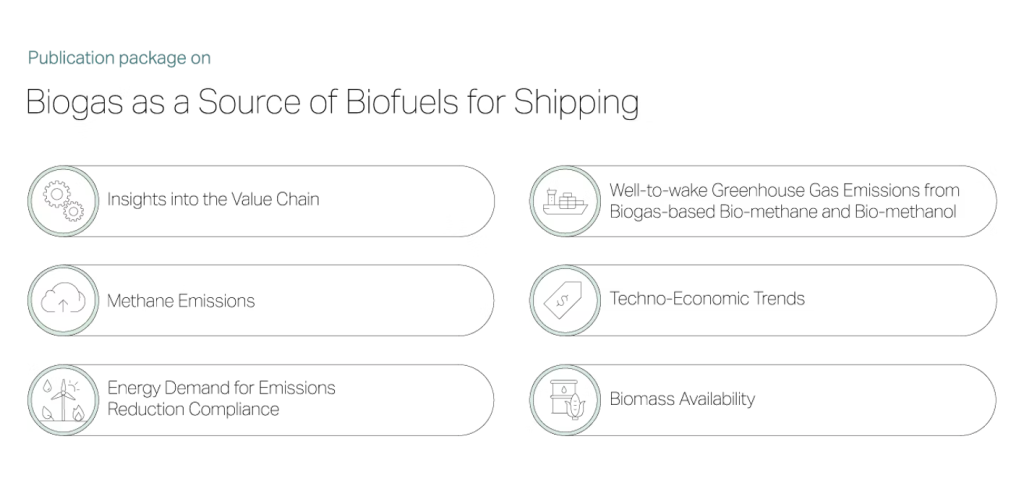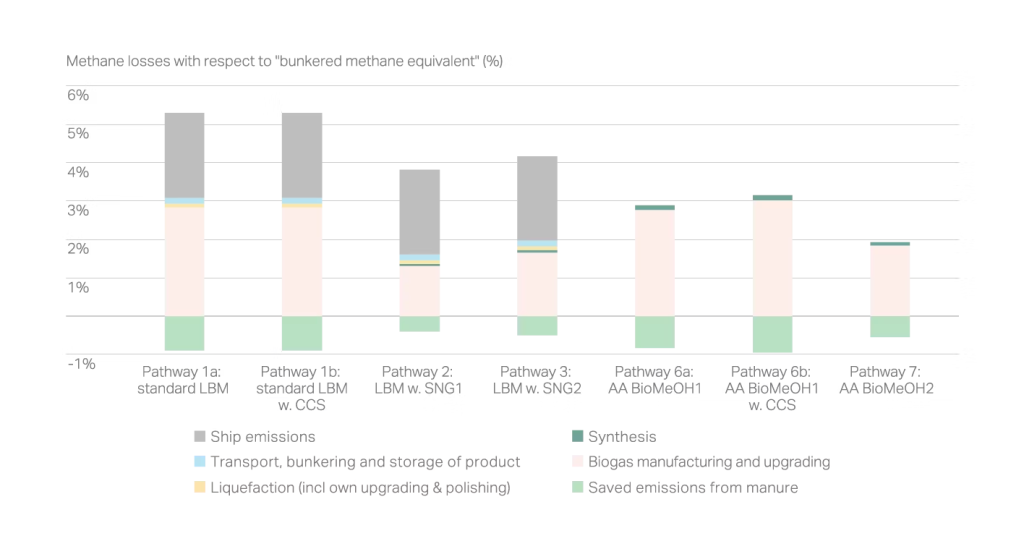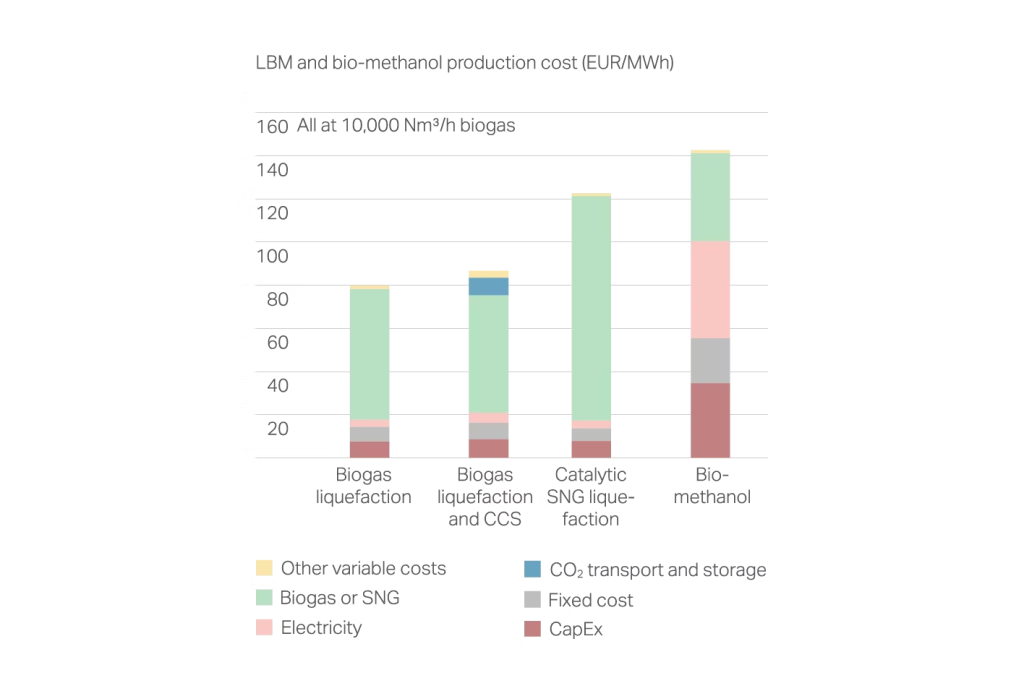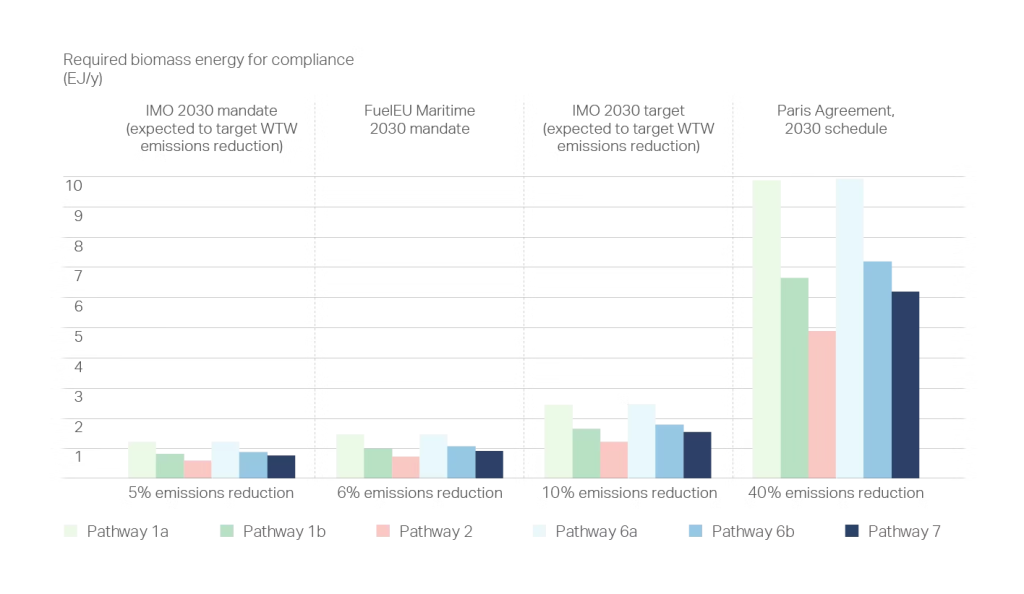Mærsk Mc-Kinney Møller Center for Zero Carbon Shipping (MMMCZCS) has published a series of reports that dive into the potential of biogas as a source of biofuels for shipping.
Biogas, generated by anaerobic digestion of biogenic waste, is a mixture of methane (CH4) and carbon dioxide (CO2) that can be easily converted into various biofuels. In this series of publications, Mærsk Mc-Kinney Møller Center for Zero Carbon Shipping explores details of the production of two specific biofuels from biogas: liquified bio-methane (LBM) and bio-methanol.
Each report in the series focuses on a different aspect of these fuel pathways to build a detailed picture of how biofuels from biogas can contribute to sustainable decarbonization of shipping.

Report #1: Insights into the Value Chain
This report reviews the main characteristics of biogas-based manufacturing chains for LBM and bio-methanol. It uses real-world commercial information to understand the status and potential of the three main steps in these value chains: biogenic feedstocks, biogas manufacture, and biofuel manufacture.
- Biogas-based biofuels offer robust support for decarbonizing shipping, particularly in the initial phases of the transition.
- These biofuels can derive value from diverse feedstocks, including waste, contributing to sustainability.
- Technologies and infrastructure for producing biogas-based biofuels are either commercially available or expected to be soon, enabling scalability.
- Emerging virtual infrastructure, like green certificates trading or book and claim systems, can bolster sustainability and business viability.
- However, controlling methane emissions across the value chain poses a significant challenge for the environmental sustainability of this sector.
This report provides comprehensive background reading for all stakeholders with an interest in better understanding these value chains and how the resulting biofuels can support shipping’s decarbonization ambitions.

Report #2: Methane Emissions
Methane emissions represent a significant obstacle to the sustainable decarbonization of the shipping industry through the utilization of biogas-based biofuels. Throughout the entire value chain, from production to combustion onboard vessels, methane emissions are identified as a key challenge. The report indicates that the majority of methane emissions occur during biogas production, followed by losses during LBM combustion on vessels. Across the value chain, methane losses typically range from 2% to 6%, depending on the type of biofuel being utilized. As a projection, methane emissions from bio-methane production in Europe alone could potentially reach 1-1.5 million tonnes per year by 2030, assuming methane losses remain at 5-6%.
Despite these challenges, existing technological solutions offer promise in mitigating methane emissions. Specifically, the report suggests that these losses could be significantly reduced to below 1%, especially for newly established biofuel plants and vessels. Achieving such reductions is crucial as it would render biogas-based biofuels highly attractive in terms of emissions intensity, thereby positioning them as a potent tool for decarbonization within the shipping sector. Consequently, effective regulation, the implementation of a certification program dedicated specifically to methane emissions, and robust enforcement mechanisms are deemed essential to curbing methane emissions and realizing the full decarbonization potential of biogas-based biofuels.
Report #3: Energy Demand for Emissions Reduction Compliance
Converting biomass into biofuel involves consumption of both fuel and electricity, with resulting decarbonization efficiency varying based on factors such as biomass type, electricity source, fugitive greenhouse gas emissions, and manufacturing process efficiency. The report explores different production pathways for LBM and bio-methanol from biogas to determine which pathways offer favorable decarbonization efficiencies and compliance potential with emissions reduction regulations like FuelEU Maritime.
A key finding indicates that the standard commercial manufacturing process for LBM can achieve high energy conversion efficiency and significant emissions reductions, especially if carbon capture and storage are integrated. Alternatively, more innovative manufacturing processes utilizing green hydrogen can maximize biomass-to-fuel conversion but entail high electricity consumption, making them preferable in regions with ample renewable electricity and limited biomass availability.
Overall, the study emphasizes that the optimization level of the production pathway is more crucial than the type of biofuel, with optimized value chains capable of delivering both LBM and bio-methanol with substantial emissions reductions.
Report #4: Well-to-Wake Greenhouse Gas Emissions
Applying a life-cycle analysis (LCA) approach, this report evaluates the environmental impact of biogas-based biofuels, encompassing displacement analysis, sustainability criteria, and well-to-wake greenhouse gas emissions associated with various production pathways. The analysis delves into factors such as electricity source, feedstock displacement, methane emissions, and avoided landfill emissions to gauge the emissions intensity of biofuels, offering insights into their effectiveness in supporting maritime decarbonization.
Findings reveal disparities in displacement risk among feedstocks, highlighting the importance of further research to optimize feedstock selection for sustainable biofuel production. Recommendations include strengthening and harmonizing sustainability criteria across jurisdictions to facilitate consistent assessment and certification of sustainable biofuels. Notably, methane emissions, feedstocks with high displacement risk, and grid electricity mix emerge as significant factors influencing biofuels’ emissions intensity.
Key strategies identified to enhance emissions reductions associated with biofuels encompass improved manure management, methane emissions mitigation, increased renewable energy utilization, excess heat recovery, and carbon capture and storage implementation.

Report #5: Techno-Economic Trends
This report presents the findings of a comprehensive techno-economic analysis of various pathways for producing LBM and bio-methanol from biogas. The aim was to pinpoint the ‘hotspots’ contributing most to biofuel costs and explore strategies for cost reduction. Biofuel production’s economics are influenced by economies of scale (e.g., capital expenditure) and diseconomies of scale (e.g., feedstock transport), suggesting an optimal production capacity for biofuel plants. Location selection, considering feedstock and product sources, also significantly influences the business case. Leveraging existing pipeline infrastructure for natural gas, with appropriate mass balancing and virtual infrastructure for green certificates trading, could substantially cut costs.
Furthermore, the analysis includes calculating the cost of decarbonization across various biofuel production pathways. Standard LBM production paired with carbon capture and storage emerges as the most cost-effective option for decarbonization per tonne of CO2 equivalent reduced. However, technologically advanced production routes may incur significantly higher costs due to elevated electricity consumption, contingent on electricity source and associated costs.
Report #6: Biomass Availability
The report delves into the potential of biofuels from biogas as a viable option for decarbonization, emphasizing the importance of the biomass source in determining its sustainability. It raises questions about the global availability of sustainable biomass feedstock for biofuel production and its implications for various industries, particularly shipping.
Drawing from various sources, the report estimates a global sustainable biomass availability of around 100 EJ/year, with the potential to produce 50-120 EJ/year of LBM or 50-90 EJ/year of bio-methanol using biogas-based production pathways. This exceeds current global shipping fuel consumption of approximately 11 EJ/year. Moreover, it suggests that biofuels from biogas could significantly contribute to meeting the Paris Agreement’s 2030 target of a 40% reduction in greenhouse gas emissions, utilizing only a small fraction of the estimated total sustainable biomass.

Given the anticipated competition for sustainable biofuels, the report recommends shipping operators pursue vertical supply chain integration to enhance access and potentially manage prices. It highlights the relevance of the findings for stakeholders across industries, especially shipping operators considering biofuels from biogas as part of their decarbonization strategy, and suggests avenues for further independent research, including local biomass availability analysis and sustainability criteria harmonization.
































































